NRSG139 Integrating Practice 1: Clinical Reasoning Cycle and Interview
VerifiedAdded on 2023/04/10
|8
|1387
|469
Essay
AI Summary
This essay provides a comprehensive analysis of a patient interview conducted within the framework of Levett-Jones' Clinical Reasoning Cycle. It details the interview setup, data collection techniques, and an insightful examination of facilitators and barriers to health relevant to the patient's lifespan stage. The essay emphasizes the importance of critical thinking and clinical reasoning in healthcare, reflecting on the learning gained through the process and highlighting potential areas for improvement in future patient interactions. References to academic literature support the discussion, reinforcing the theoretical underpinnings of the practical application of the clinical reasoning cycle in a healthcare setting. Desklib provides students access to similar solved assignments and resources.
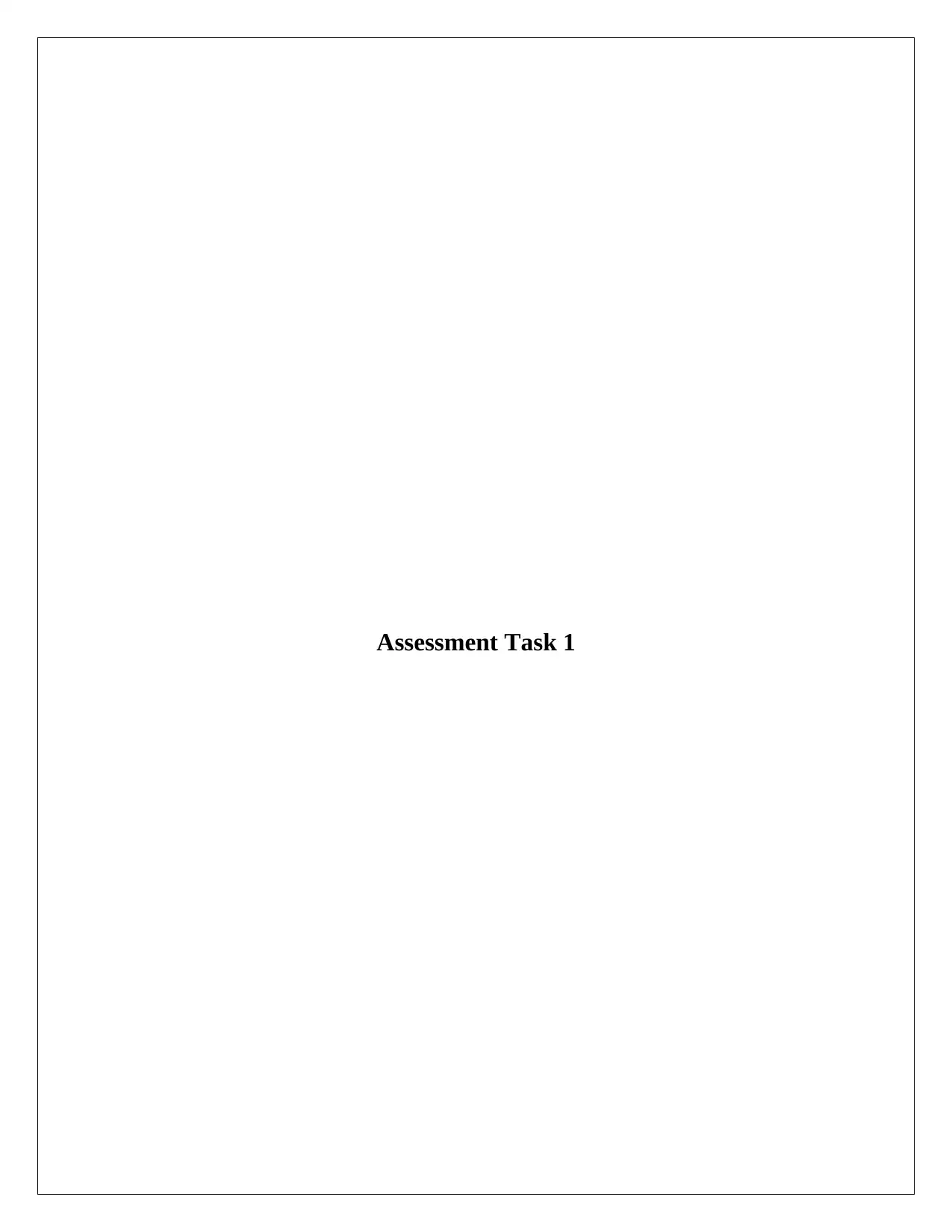
Assessment Task 1
Paraphrase This Document
Need a fresh take? Get an instant paraphrase of this document with our AI Paraphraser
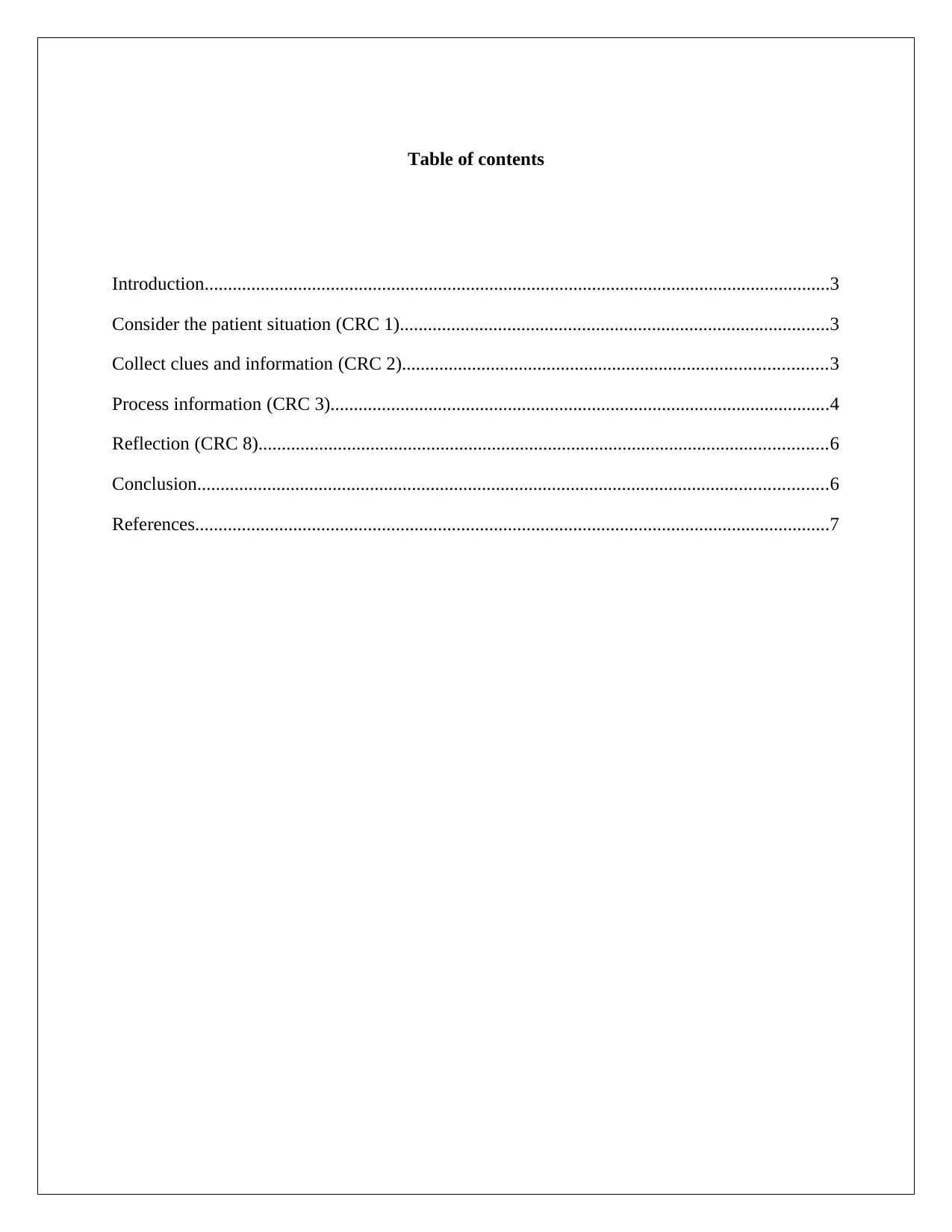
Table of contents
Introduction......................................................................................................................................3
Consider the patient situation (CRC 1)............................................................................................3
Collect clues and information (CRC 2)...........................................................................................3
Process information (CRC 3)...........................................................................................................4
Reflection (CRC 8)..........................................................................................................................6
Conclusion.......................................................................................................................................6
References........................................................................................................................................7
Introduction......................................................................................................................................3
Consider the patient situation (CRC 1)............................................................................................3
Collect clues and information (CRC 2)...........................................................................................3
Process information (CRC 3)...........................................................................................................4
Reflection (CRC 8)..........................................................................................................................6
Conclusion.......................................................................................................................................6
References........................................................................................................................................7
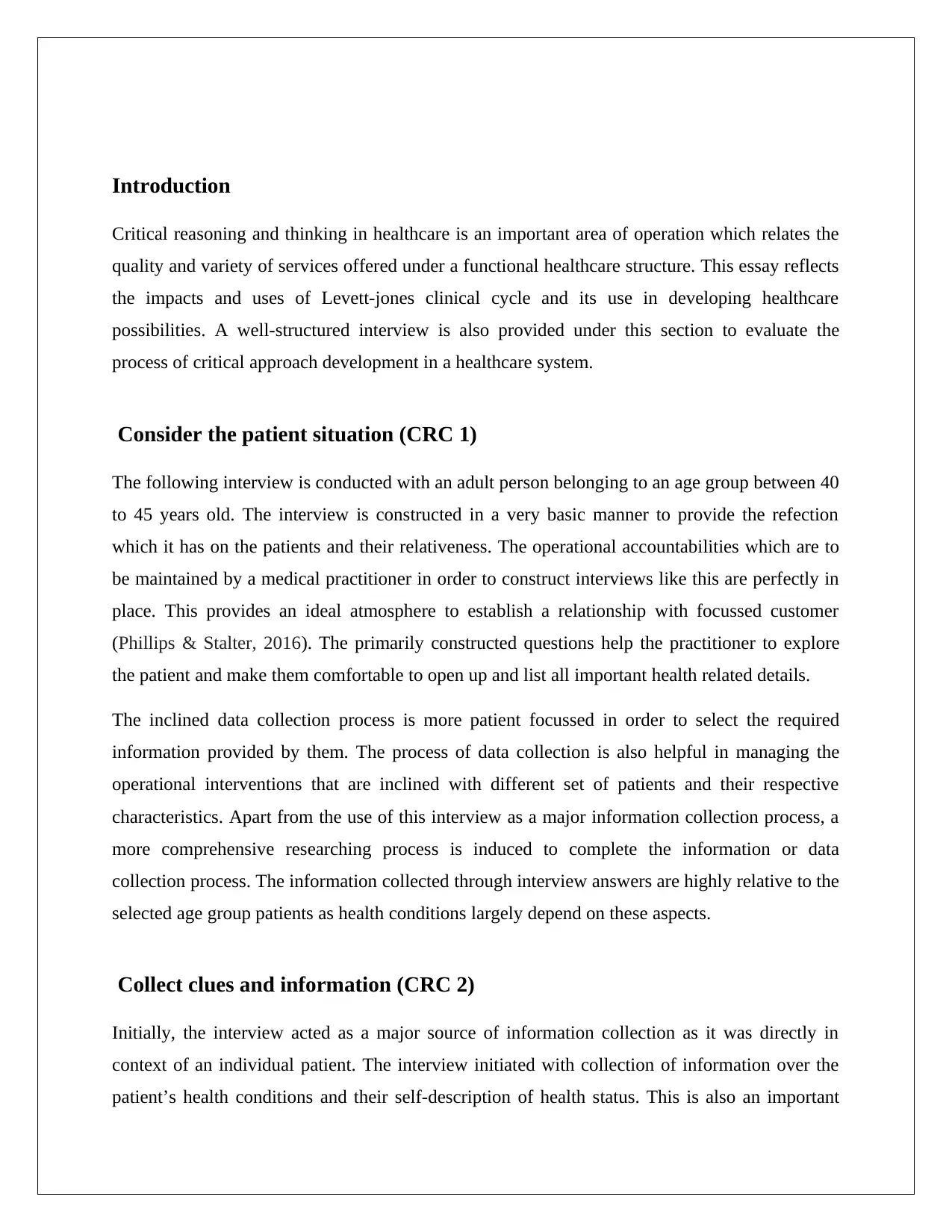
Introduction
Critical reasoning and thinking in healthcare is an important area of operation which relates the
quality and variety of services offered under a functional healthcare structure. This essay reflects
the impacts and uses of Levett-jones clinical cycle and its use in developing healthcare
possibilities. A well-structured interview is also provided under this section to evaluate the
process of critical approach development in a healthcare system.
Consider the patient situation (CRC 1)
The following interview is conducted with an adult person belonging to an age group between 40
to 45 years old. The interview is constructed in a very basic manner to provide the refection
which it has on the patients and their relativeness. The operational accountabilities which are to
be maintained by a medical practitioner in order to construct interviews like this are perfectly in
place. This provides an ideal atmosphere to establish a relationship with focussed customer
(Phillips & Stalter, 2016). The primarily constructed questions help the practitioner to explore
the patient and make them comfortable to open up and list all important health related details.
The inclined data collection process is more patient focussed in order to select the required
information provided by them. The process of data collection is also helpful in managing the
operational interventions that are inclined with different set of patients and their respective
characteristics. Apart from the use of this interview as a major information collection process, a
more comprehensive researching process is induced to complete the information or data
collection process. The information collected through interview answers are highly relative to the
selected age group patients as health conditions largely depend on these aspects.
Collect clues and information (CRC 2)
Initially, the interview acted as a major source of information collection as it was directly in
context of an individual patient. The interview initiated with collection of information over the
patient’s health conditions and their self-description of health status. This is also an important
Critical reasoning and thinking in healthcare is an important area of operation which relates the
quality and variety of services offered under a functional healthcare structure. This essay reflects
the impacts and uses of Levett-jones clinical cycle and its use in developing healthcare
possibilities. A well-structured interview is also provided under this section to evaluate the
process of critical approach development in a healthcare system.
Consider the patient situation (CRC 1)
The following interview is conducted with an adult person belonging to an age group between 40
to 45 years old. The interview is constructed in a very basic manner to provide the refection
which it has on the patients and their relativeness. The operational accountabilities which are to
be maintained by a medical practitioner in order to construct interviews like this are perfectly in
place. This provides an ideal atmosphere to establish a relationship with focussed customer
(Phillips & Stalter, 2016). The primarily constructed questions help the practitioner to explore
the patient and make them comfortable to open up and list all important health related details.
The inclined data collection process is more patient focussed in order to select the required
information provided by them. The process of data collection is also helpful in managing the
operational interventions that are inclined with different set of patients and their respective
characteristics. Apart from the use of this interview as a major information collection process, a
more comprehensive researching process is induced to complete the information or data
collection process. The information collected through interview answers are highly relative to the
selected age group patients as health conditions largely depend on these aspects.
Collect clues and information (CRC 2)
Initially, the interview acted as a major source of information collection as it was directly in
context of an individual patient. The interview initiated with collection of information over the
patient’s health conditions and their self-description of health status. This is also an important
⊘ This is a preview!⊘
Do you want full access?
Subscribe today to unlock all pages.

Trusted by 1+ million students worldwide
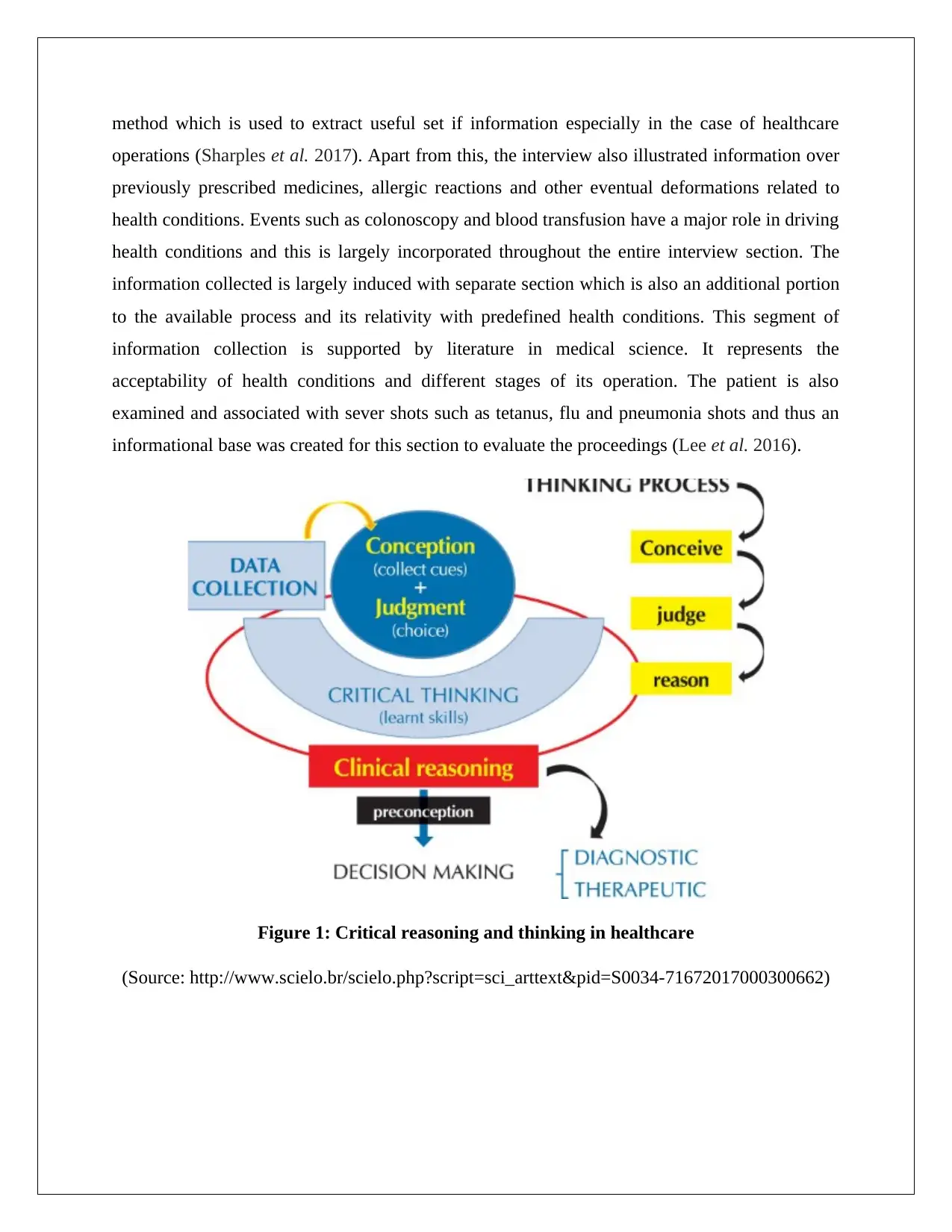
method which is used to extract useful set if information especially in the case of healthcare
operations (Sharples et al. 2017). Apart from this, the interview also illustrated information over
previously prescribed medicines, allergic reactions and other eventual deformations related to
health conditions. Events such as colonoscopy and blood transfusion have a major role in driving
health conditions and this is largely incorporated throughout the entire interview section. The
information collected is largely induced with separate section which is also an additional portion
to the available process and its relativity with predefined health conditions. This segment of
information collection is supported by literature in medical science. It represents the
acceptability of health conditions and different stages of its operation. The patient is also
examined and associated with sever shots such as tetanus, flu and pneumonia shots and thus an
informational base was created for this section to evaluate the proceedings (Lee et al. 2016).
Figure 1: Critical reasoning and thinking in healthcare
(Source: http://www.scielo.br/scielo.php?script=sci_arttext&pid=S0034-71672017000300662)
operations (Sharples et al. 2017). Apart from this, the interview also illustrated information over
previously prescribed medicines, allergic reactions and other eventual deformations related to
health conditions. Events such as colonoscopy and blood transfusion have a major role in driving
health conditions and this is largely incorporated throughout the entire interview section. The
information collected is largely induced with separate section which is also an additional portion
to the available process and its relativity with predefined health conditions. This segment of
information collection is supported by literature in medical science. It represents the
acceptability of health conditions and different stages of its operation. The patient is also
examined and associated with sever shots such as tetanus, flu and pneumonia shots and thus an
informational base was created for this section to evaluate the proceedings (Lee et al. 2016).
Figure 1: Critical reasoning and thinking in healthcare
(Source: http://www.scielo.br/scielo.php?script=sci_arttext&pid=S0034-71672017000300662)
Paraphrase This Document
Need a fresh take? Get an instant paraphrase of this document with our AI Paraphraser
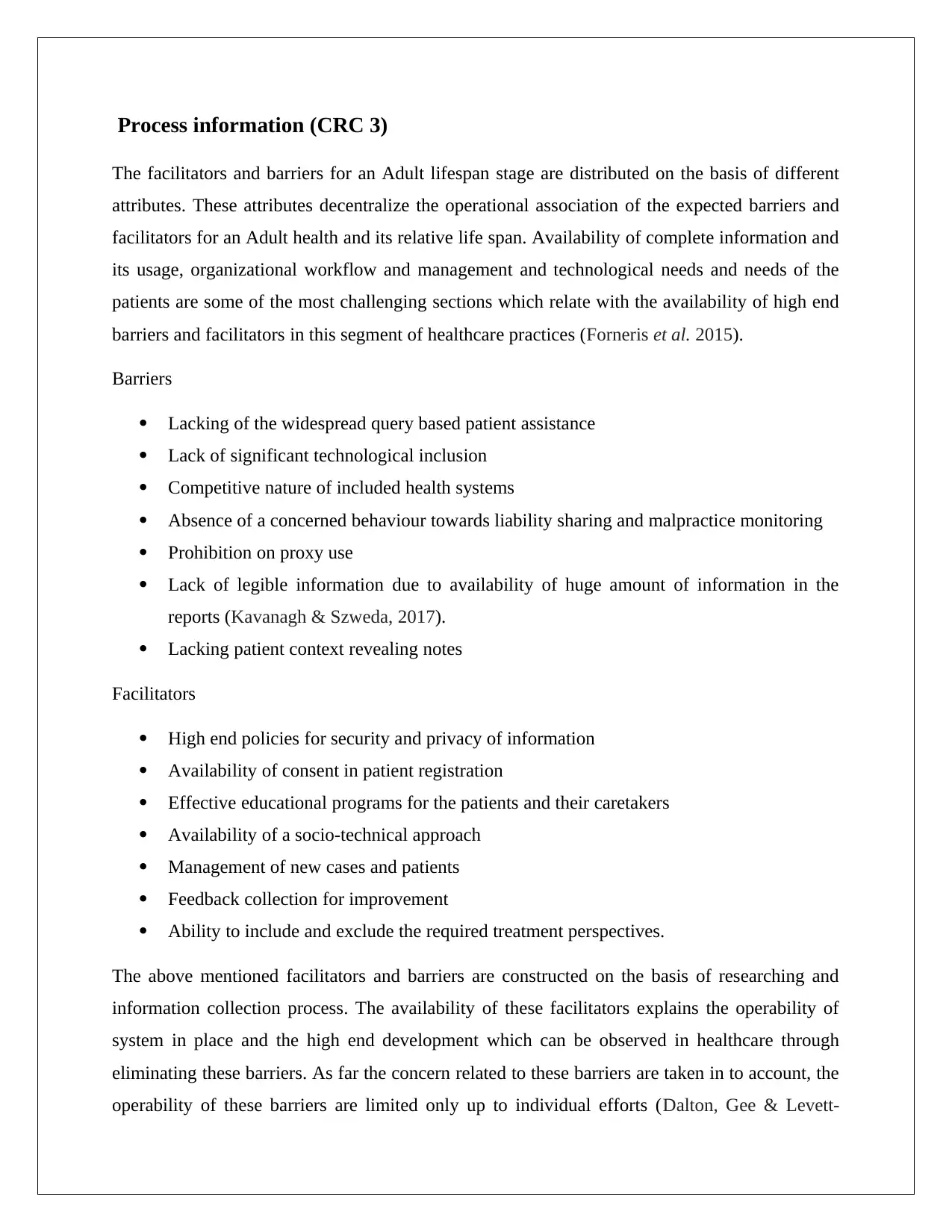
Process information (CRC 3)
The facilitators and barriers for an Adult lifespan stage are distributed on the basis of different
attributes. These attributes decentralize the operational association of the expected barriers and
facilitators for an Adult health and its relative life span. Availability of complete information and
its usage, organizational workflow and management and technological needs and needs of the
patients are some of the most challenging sections which relate with the availability of high end
barriers and facilitators in this segment of healthcare practices (Forneris et al. 2015).
Barriers
Lacking of the widespread query based patient assistance
Lack of significant technological inclusion
Competitive nature of included health systems
Absence of a concerned behaviour towards liability sharing and malpractice monitoring
Prohibition on proxy use
Lack of legible information due to availability of huge amount of information in the
reports (Kavanagh & Szweda, 2017).
Lacking patient context revealing notes
Facilitators
High end policies for security and privacy of information
Availability of consent in patient registration
Effective educational programs for the patients and their caretakers
Availability of a socio-technical approach
Management of new cases and patients
Feedback collection for improvement
Ability to include and exclude the required treatment perspectives.
The above mentioned facilitators and barriers are constructed on the basis of researching and
information collection process. The availability of these facilitators explains the operability of
system in place and the high end development which can be observed in healthcare through
eliminating these barriers. As far the concern related to these barriers are taken in to account, the
operability of these barriers are limited only up to individual efforts (Dalton, Gee & Levett-
The facilitators and barriers for an Adult lifespan stage are distributed on the basis of different
attributes. These attributes decentralize the operational association of the expected barriers and
facilitators for an Adult health and its relative life span. Availability of complete information and
its usage, organizational workflow and management and technological needs and needs of the
patients are some of the most challenging sections which relate with the availability of high end
barriers and facilitators in this segment of healthcare practices (Forneris et al. 2015).
Barriers
Lacking of the widespread query based patient assistance
Lack of significant technological inclusion
Competitive nature of included health systems
Absence of a concerned behaviour towards liability sharing and malpractice monitoring
Prohibition on proxy use
Lack of legible information due to availability of huge amount of information in the
reports (Kavanagh & Szweda, 2017).
Lacking patient context revealing notes
Facilitators
High end policies for security and privacy of information
Availability of consent in patient registration
Effective educational programs for the patients and their caretakers
Availability of a socio-technical approach
Management of new cases and patients
Feedback collection for improvement
Ability to include and exclude the required treatment perspectives.
The above mentioned facilitators and barriers are constructed on the basis of researching and
information collection process. The availability of these facilitators explains the operability of
system in place and the high end development which can be observed in healthcare through
eliminating these barriers. As far the concern related to these barriers are taken in to account, the
operability of these barriers are limited only up to individual efforts (Dalton, Gee & Levett-
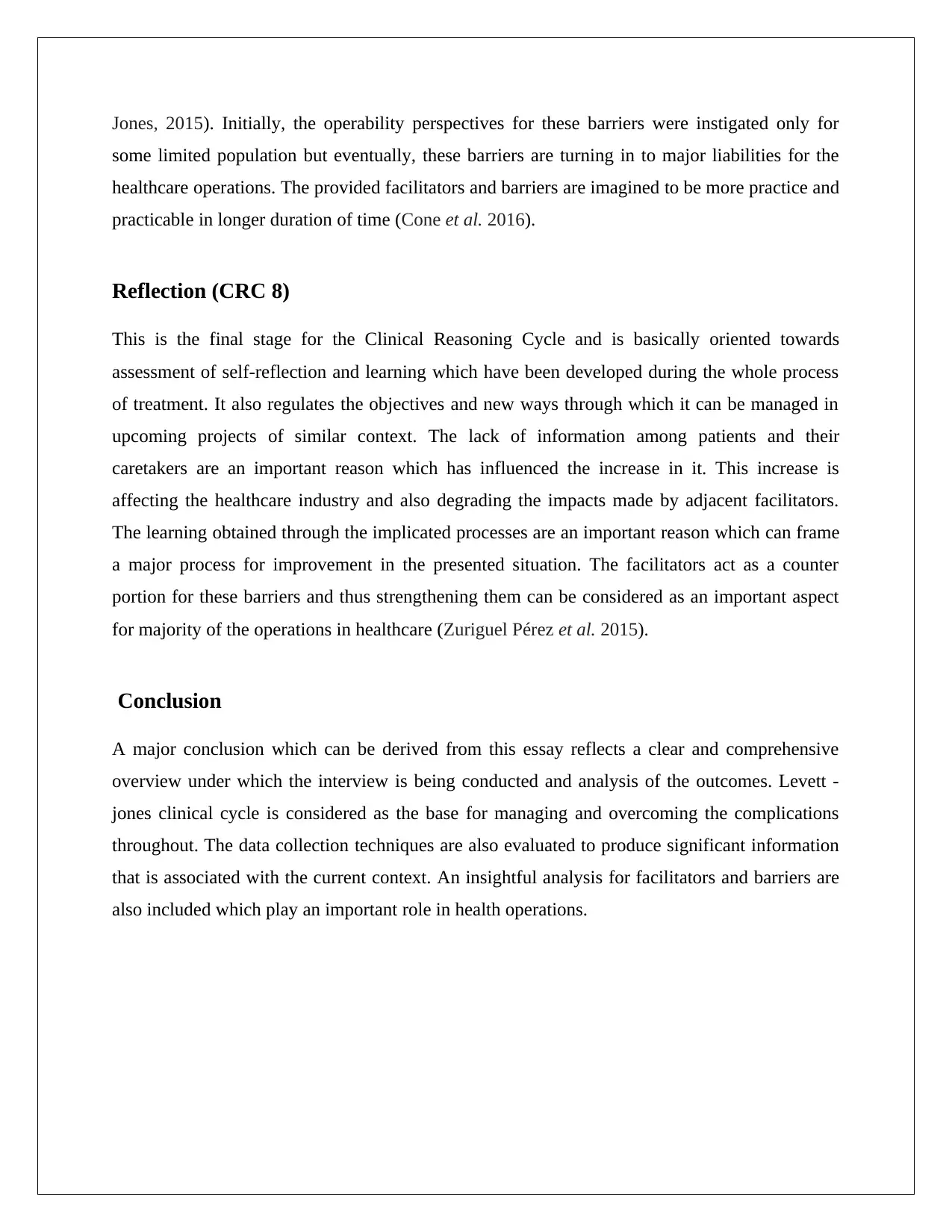
Jones, 2015). Initially, the operability perspectives for these barriers were instigated only for
some limited population but eventually, these barriers are turning in to major liabilities for the
healthcare operations. The provided facilitators and barriers are imagined to be more practice and
practicable in longer duration of time (Cone et al. 2016).
Reflection (CRC 8)
This is the final stage for the Clinical Reasoning Cycle and is basically oriented towards
assessment of self-reflection and learning which have been developed during the whole process
of treatment. It also regulates the objectives and new ways through which it can be managed in
upcoming projects of similar context. The lack of information among patients and their
caretakers are an important reason which has influenced the increase in it. This increase is
affecting the healthcare industry and also degrading the impacts made by adjacent facilitators.
The learning obtained through the implicated processes are an important reason which can frame
a major process for improvement in the presented situation. The facilitators act as a counter
portion for these barriers and thus strengthening them can be considered as an important aspect
for majority of the operations in healthcare (Zuriguel Pérez et al. 2015).
Conclusion
A major conclusion which can be derived from this essay reflects a clear and comprehensive
overview under which the interview is being conducted and analysis of the outcomes. Levett -
jones clinical cycle is considered as the base for managing and overcoming the complications
throughout. The data collection techniques are also evaluated to produce significant information
that is associated with the current context. An insightful analysis for facilitators and barriers are
also included which play an important role in health operations.
some limited population but eventually, these barriers are turning in to major liabilities for the
healthcare operations. The provided facilitators and barriers are imagined to be more practice and
practicable in longer duration of time (Cone et al. 2016).
Reflection (CRC 8)
This is the final stage for the Clinical Reasoning Cycle and is basically oriented towards
assessment of self-reflection and learning which have been developed during the whole process
of treatment. It also regulates the objectives and new ways through which it can be managed in
upcoming projects of similar context. The lack of information among patients and their
caretakers are an important reason which has influenced the increase in it. This increase is
affecting the healthcare industry and also degrading the impacts made by adjacent facilitators.
The learning obtained through the implicated processes are an important reason which can frame
a major process for improvement in the presented situation. The facilitators act as a counter
portion for these barriers and thus strengthening them can be considered as an important aspect
for majority of the operations in healthcare (Zuriguel Pérez et al. 2015).
Conclusion
A major conclusion which can be derived from this essay reflects a clear and comprehensive
overview under which the interview is being conducted and analysis of the outcomes. Levett -
jones clinical cycle is considered as the base for managing and overcoming the complications
throughout. The data collection techniques are also evaluated to produce significant information
that is associated with the current context. An insightful analysis for facilitators and barriers are
also included which play an important role in health operations.
⊘ This is a preview!⊘
Do you want full access?
Subscribe today to unlock all pages.

Trusted by 1+ million students worldwide
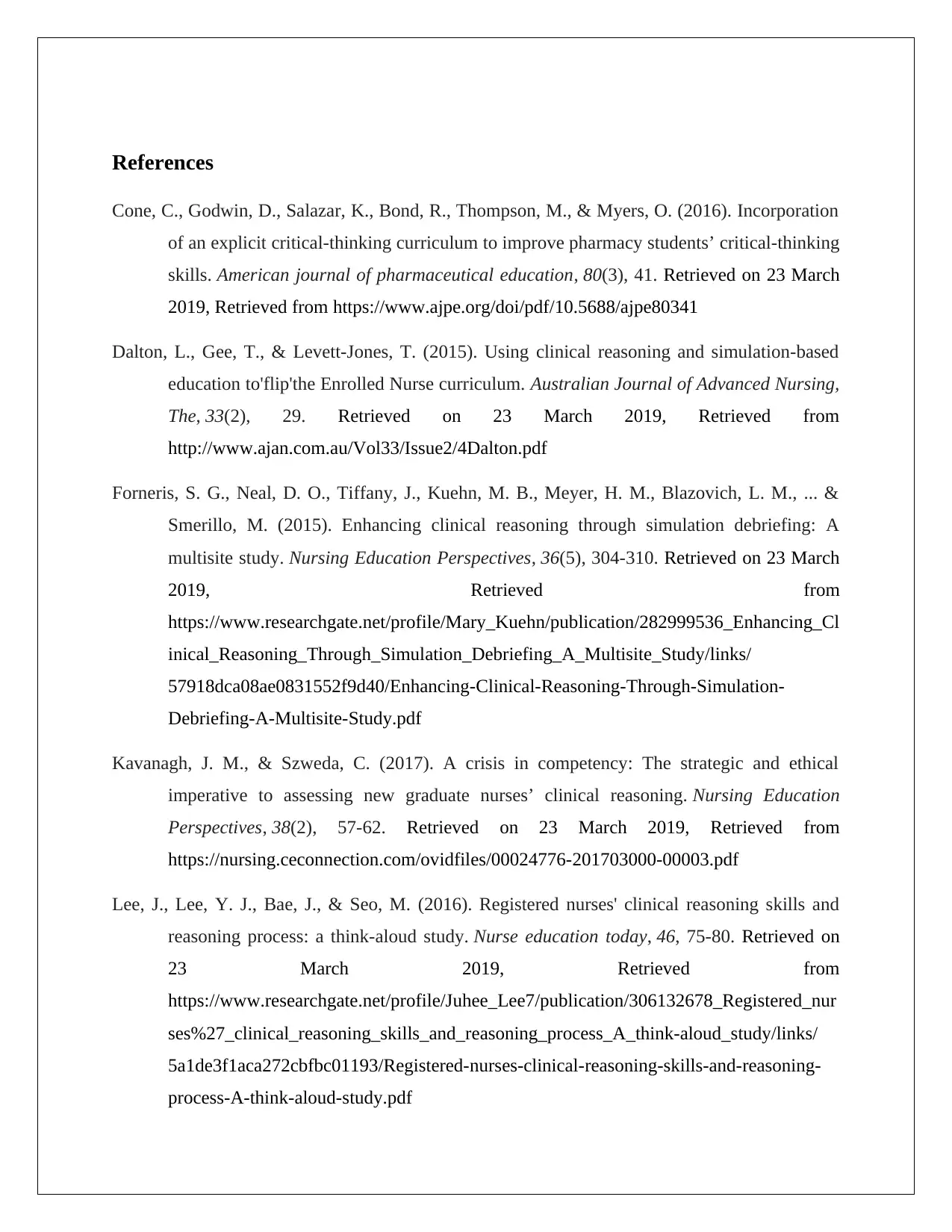
References
Cone, C., Godwin, D., Salazar, K., Bond, R., Thompson, M., & Myers, O. (2016). Incorporation
of an explicit critical-thinking curriculum to improve pharmacy students’ critical-thinking
skills. American journal of pharmaceutical education, 80(3), 41. Retrieved on 23 March
2019, Retrieved from https://www.ajpe.org/doi/pdf/10.5688/ajpe80341
Dalton, L., Gee, T., & Levett-Jones, T. (2015). Using clinical reasoning and simulation-based
education to'flip'the Enrolled Nurse curriculum. Australian Journal of Advanced Nursing,
The, 33(2), 29. Retrieved on 23 March 2019, Retrieved from
http://www.ajan.com.au/Vol33/Issue2/4Dalton.pdf
Forneris, S. G., Neal, D. O., Tiffany, J., Kuehn, M. B., Meyer, H. M., Blazovich, L. M., ... &
Smerillo, M. (2015). Enhancing clinical reasoning through simulation debriefing: A
multisite study. Nursing Education Perspectives, 36(5), 304-310. Retrieved on 23 March
2019, Retrieved from
https://www.researchgate.net/profile/Mary_Kuehn/publication/282999536_Enhancing_Cl
inical_Reasoning_Through_Simulation_Debriefing_A_Multisite_Study/links/
57918dca08ae0831552f9d40/Enhancing-Clinical-Reasoning-Through-Simulation-
Debriefing-A-Multisite-Study.pdf
Kavanagh, J. M., & Szweda, C. (2017). A crisis in competency: The strategic and ethical
imperative to assessing new graduate nurses’ clinical reasoning. Nursing Education
Perspectives, 38(2), 57-62. Retrieved on 23 March 2019, Retrieved from
https://nursing.ceconnection.com/ovidfiles/00024776-201703000-00003.pdf
Lee, J., Lee, Y. J., Bae, J., & Seo, M. (2016). Registered nurses' clinical reasoning skills and
reasoning process: a think-aloud study. Nurse education today, 46, 75-80. Retrieved on
23 March 2019, Retrieved from
https://www.researchgate.net/profile/Juhee_Lee7/publication/306132678_Registered_nur
ses%27_clinical_reasoning_skills_and_reasoning_process_A_think-aloud_study/links/
5a1de3f1aca272cbfbc01193/Registered-nurses-clinical-reasoning-skills-and-reasoning-
process-A-think-aloud-study.pdf
Cone, C., Godwin, D., Salazar, K., Bond, R., Thompson, M., & Myers, O. (2016). Incorporation
of an explicit critical-thinking curriculum to improve pharmacy students’ critical-thinking
skills. American journal of pharmaceutical education, 80(3), 41. Retrieved on 23 March
2019, Retrieved from https://www.ajpe.org/doi/pdf/10.5688/ajpe80341
Dalton, L., Gee, T., & Levett-Jones, T. (2015). Using clinical reasoning and simulation-based
education to'flip'the Enrolled Nurse curriculum. Australian Journal of Advanced Nursing,
The, 33(2), 29. Retrieved on 23 March 2019, Retrieved from
http://www.ajan.com.au/Vol33/Issue2/4Dalton.pdf
Forneris, S. G., Neal, D. O., Tiffany, J., Kuehn, M. B., Meyer, H. M., Blazovich, L. M., ... &
Smerillo, M. (2015). Enhancing clinical reasoning through simulation debriefing: A
multisite study. Nursing Education Perspectives, 36(5), 304-310. Retrieved on 23 March
2019, Retrieved from
https://www.researchgate.net/profile/Mary_Kuehn/publication/282999536_Enhancing_Cl
inical_Reasoning_Through_Simulation_Debriefing_A_Multisite_Study/links/
57918dca08ae0831552f9d40/Enhancing-Clinical-Reasoning-Through-Simulation-
Debriefing-A-Multisite-Study.pdf
Kavanagh, J. M., & Szweda, C. (2017). A crisis in competency: The strategic and ethical
imperative to assessing new graduate nurses’ clinical reasoning. Nursing Education
Perspectives, 38(2), 57-62. Retrieved on 23 March 2019, Retrieved from
https://nursing.ceconnection.com/ovidfiles/00024776-201703000-00003.pdf
Lee, J., Lee, Y. J., Bae, J., & Seo, M. (2016). Registered nurses' clinical reasoning skills and
reasoning process: a think-aloud study. Nurse education today, 46, 75-80. Retrieved on
23 March 2019, Retrieved from
https://www.researchgate.net/profile/Juhee_Lee7/publication/306132678_Registered_nur
ses%27_clinical_reasoning_skills_and_reasoning_process_A_think-aloud_study/links/
5a1de3f1aca272cbfbc01193/Registered-nurses-clinical-reasoning-skills-and-reasoning-
process-A-think-aloud-study.pdf
Paraphrase This Document
Need a fresh take? Get an instant paraphrase of this document with our AI Paraphraser
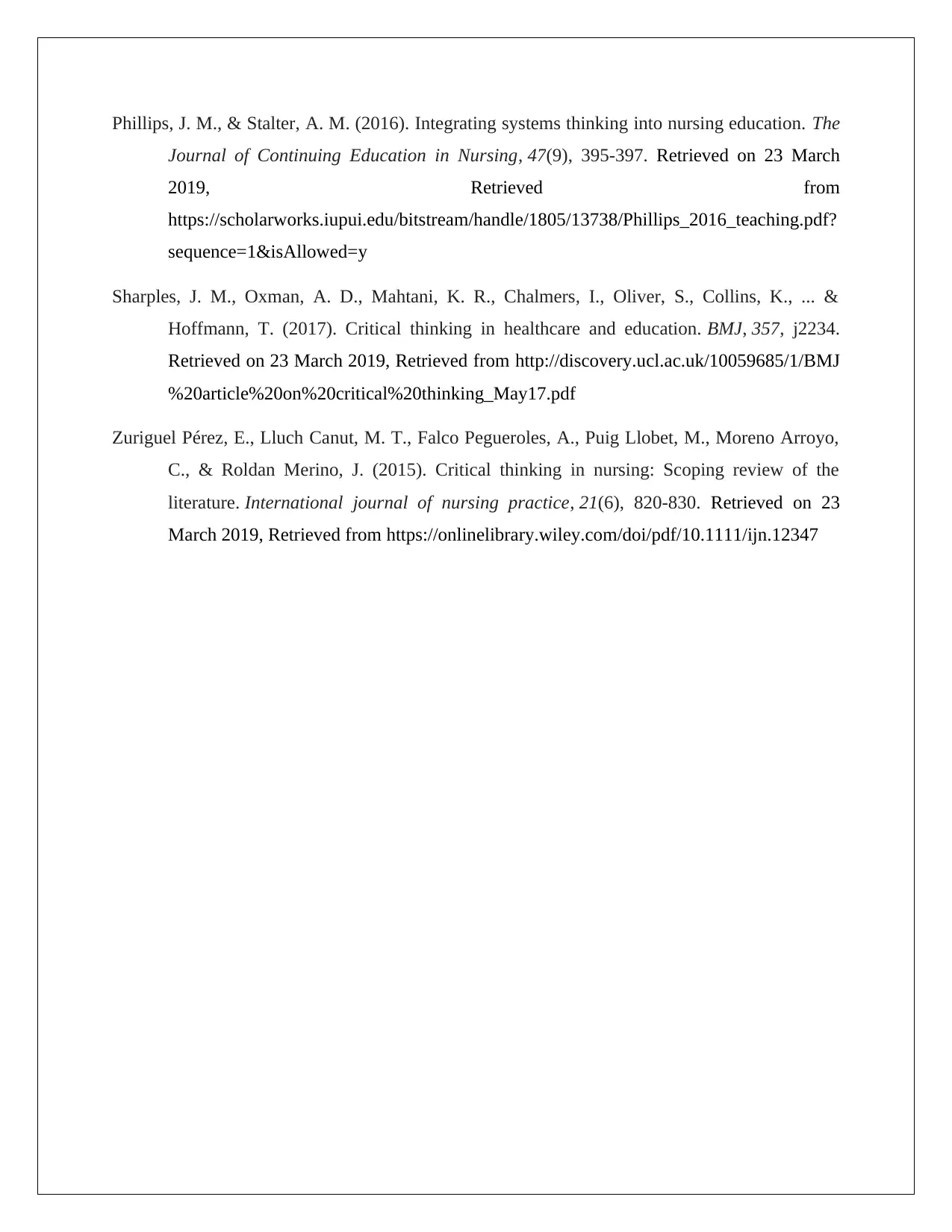
Phillips, J. M., & Stalter, A. M. (2016). Integrating systems thinking into nursing education. The
Journal of Continuing Education in Nursing, 47(9), 395-397. Retrieved on 23 March
2019, Retrieved from
https://scholarworks.iupui.edu/bitstream/handle/1805/13738/Phillips_2016_teaching.pdf?
sequence=1&isAllowed=y
Sharples, J. M., Oxman, A. D., Mahtani, K. R., Chalmers, I., Oliver, S., Collins, K., ... &
Hoffmann, T. (2017). Critical thinking in healthcare and education. BMJ, 357, j2234.
Retrieved on 23 March 2019, Retrieved from http://discovery.ucl.ac.uk/10059685/1/BMJ
%20article%20on%20critical%20thinking_May17.pdf
Zuriguel Pérez, E., Lluch Canut, M. T., Falco Pegueroles, A., Puig Llobet, M., Moreno Arroyo,
C., & Roldan Merino, J. (2015). Critical thinking in nursing: Scoping review of the
literature. International journal of nursing practice, 21(6), 820-830. Retrieved on 23
March 2019, Retrieved from https://onlinelibrary.wiley.com/doi/pdf/10.1111/ijn.12347
Journal of Continuing Education in Nursing, 47(9), 395-397. Retrieved on 23 March
2019, Retrieved from
https://scholarworks.iupui.edu/bitstream/handle/1805/13738/Phillips_2016_teaching.pdf?
sequence=1&isAllowed=y
Sharples, J. M., Oxman, A. D., Mahtani, K. R., Chalmers, I., Oliver, S., Collins, K., ... &
Hoffmann, T. (2017). Critical thinking in healthcare and education. BMJ, 357, j2234.
Retrieved on 23 March 2019, Retrieved from http://discovery.ucl.ac.uk/10059685/1/BMJ
%20article%20on%20critical%20thinking_May17.pdf
Zuriguel Pérez, E., Lluch Canut, M. T., Falco Pegueroles, A., Puig Llobet, M., Moreno Arroyo,
C., & Roldan Merino, J. (2015). Critical thinking in nursing: Scoping review of the
literature. International journal of nursing practice, 21(6), 820-830. Retrieved on 23
March 2019, Retrieved from https://onlinelibrary.wiley.com/doi/pdf/10.1111/ijn.12347
1 out of 8
Related Documents
Your All-in-One AI-Powered Toolkit for Academic Success.
+13062052269
info@desklib.com
Available 24*7 on WhatsApp / Email
![[object Object]](/_next/static/media/star-bottom.7253800d.svg)
Unlock your academic potential
Copyright © 2020–2025 A2Z Services. All Rights Reserved. Developed and managed by ZUCOL.





